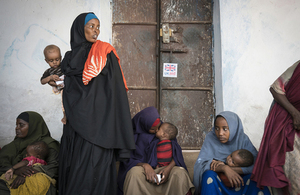International Development Secretary calls on the global community to 'end the cycle of crisis' in Somalia
Penny Mordaunt tells donors that despite success at averting a famine last year, drought is still a serious threat in Somalia.

Mothers tend to their children at a UNICEF health clinic in Somalia supported by UK aid. Photo credit: UNICEF
International Development Secretary Penny Mordaunt will tell an audience of global donors today that while swift action last year saved thousands of lives and held-off famine in Somalia, “the job is not yet done”.
At an event co-hosted by the Department for International Development (DFID), the Federal Republic of Somalia and the Office for the Coordination of Humanitarian Affairs (OCHA), the International Development Secretary will praise the efforts of the international community in 2017 – but call for continued global support for the 5.4 million people in need living in Somalia.
Six years ago Somalia was ravaged by a deadly famine which killed 260,000 people - half of those who died were children.
With extreme weathers and an unprecedented fourth consecutive year of poor rain forecast for the country, Ms Mordaunt will today deliver the stark warning that half the population is still hungry and at risk of disease – and will call on global partners to generate innovative ideas for building long-term resilience to drought.
International Development Secretary Penny Mordaunt said:
Last year the UK stood up and called for international action at a landmark conference to agree critical help for the people of Somalia. Together, we helped avert a famine and saved thousands of lives.
But drought continues to haunt Somalia, where today half the population is hungry and at risk of disease. The job is not yet done.
Drought and famine do not have to go hand-in-hand. We must harness the potential of new ideas to build future-proof resilience against drought – and end the cycle of crisis.
We cannot let the world forget Somalia. It’s not just the right thing to do - we are all less safe when hunger and poverty are free to feed extremism and mass irregular migration.
The International Development Secretary will today announce a further emergency package to get urgently needed medical, nutritional, health and livelihood support to the country, including to 54,000 children who will be treated for Severe Acute Malnutrition.
The package will be distributed before the end of March 2018, to ensure urgent delivery of these life-saving services.
UN humanitarian chief and Emergency Relief Coordinator Mark Lowcock said:
Last year, more than US$90 million from the UN’s Central Emergency Response Fund (CERF) and the Somalia Humanitarian Fund were released to mitigate against the worsening food security situation in Somalia.
Thanks to generous and timely contributions from the UK and other donors, the Somalia Humanitarian Fund is this year already programming $22 million for life-saving support. The CERF is also stepping up quickly with complementary, time-critical and life-saving funding which will help minimize further displacement of people in Somalia and other risks caused by the drought.
Ends
Notes to Editors:
Today’s event, which is taking place at the Department for International Development, will be opened by International Development Secretary Penny Mordaunt and Gamal Hassan, the Minister of Planning, Investment and Economic Development of the Federal Republic of Somalia. Harriett Baldwin, the Minister for Africa, will also be in attendance, as will Mark Lowcock, UN Under-Secretary-General for Humanitarian Affairs and Emergency Relief Coordinator.
Today’s £24.6million funding package will be allocated as follows and will be spent before the end of March 2018, to ensure urgent delivery:
- 54,000 children will be treated for severe acute malnutrition;
- 157,480 people will receive emergency water and sanitation;
- 400,000 people will be treated by emergency health services, including cholera prevention, measles vaccination and life-saving primary health care services;
- 212,315 children and 53,333 pregnant and nursing mothers will receive treatment for moderate acute malnutrition;
- Multi-purpose cash transfers will be collected by 676,920 people;
- And 9,850 households will be able to support a harvest thanks to agricultural and pastoral livelihood support packages, including delivery of 300 water bladders and 500,000 animals in 25,000 households.
This £24.6million package from the Crisis Reserve Fund will be delivered through The United Nations World Food Programme, the United Nations Food and Agriculture Organisation, the United Nations Children’s Fund and the Norwegian Refugee Council - this package announced today brings the total UK contribution to the 2018 Humanitarian Response to £85.65million.
This includes the £21million announced by the Secretary of State in January, £40million already allocated within the DFID Somalia Country Programme, and an additional £24.6million made available today from the UK Government Crisis Reserve.
The Crisis Reserve was designed to enable the UK to scale up support in humanitarian crises such as this one.
The £21million announced in December and the emergency £25million from the Crisis Reserve will be released before the end of March – ensuring that funds are already available in the system to support early intervention.
All of these funds will be managed and disbursed through DFID’s existing Somalia Humanitarian and Resilience Programme (SHARP).
General media queries (24 hours)
Email mediateam@dfid.gov.uk
Telephone 020 7023 0600
If you have an urgent media query, please email the DFID Media Team on mediateam@dfid.gov.uk in the first instance and we will respond as soon as possible.